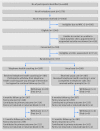Self management of patients with mild COPD in primary care: randomised controlled trial
- PMID: 29899047
- PMCID: PMC5998171
- DOI: 10.1136/bmj.k2241
Self management of patients with mild COPD in primary care: randomised controlled trial
Abstract
Objective: To evaluate the effectiveness of telephone health coaching delivered by a nurse to support self management in a primary care population with mild symptoms of chronic obstructive pulmonary disease (COPD).
Design: Multicentre randomised controlled trial.
Setting: 71 general practices in four areas of England.
Participants: 577 patients with Medical Research Council dyspnoea scale scores of 1 or 2, recruited from primary care COPD registers with spirometry confirmed diagnosis. Patients were randomised to telephone health coaching (n=289) or usual care (n=288).
Interventions: Telephone health coaching intervention delivered by nurses, underpinned by Social Cognitive Theory. The coaching promoted accessing smoking cessation services, increasing physical activity, medication management, and action planning (4 sessions over 11 weeks; postal information at weeks 16 and 24). The nurses received two days of training. The usual care group received a leaflet about COPD.
Main outcome measures: The primary outcome was health related quality of life at 12 months using the short version of the St George's Respiratory Questionnaire (SGRQ-C).
Results: The intervention was delivered with good fidelity: 86% of scheduled calls were delivered; 75% of patients received all four calls. 92% of patients were followed-up at six months and 89% at 12 months. There was no difference in SGRQ-C total score at 12 months (mean difference -1.3, 95% confidence interval -3.6 to 0.9, P=0.23). Compared with patients in the usual care group, at six months follow-up, the intervention group reported greater physical activity, more had received a care plan (44% v 30%), rescue packs of antibiotics (37% v 29%), and inhaler use technique check (68% v 55%).
Conclusions: A new telephone health coaching intervention to promote behaviour change in primary care patients with mild symptoms of dyspnoea did lead to changes in self management activities, but did not improve health related quality of life.
Trial registration: Current controlled trials ISRCTN 06710391.
Published by the BMJ Publishing Group Limited. For permission to use (where not already granted under a licence) please go to http://group.bmj.com/group/rights-licensing/permissions.
Conflict of interest statement
Competing interests: All authors have completed the ICMJE uniform disclosure form at www.icmje.org/coi_disclosure.pdf. RJ reports grants from National Institute for Health Research (NIHR) and PA reports grants from NIHR School for Primary Care Research during the conduct of the study. CH has received expenses and fees for his media work. CH has received expenses from the World Health Organization (WHO) and holds grant funding from the NIHR, the NIHR School of Primary Care Research, The Wellcome Trust, and the WHO. CH has received financial remuneration from an asbestos case. CH has also received income from the publication of a series of toolkit books published by Blackwells. On occasion, CH receives expenses for teaching evidence-based medicine and is also paid for his GP work in NHS out of hours. Centre for Evidence-Based Medicine jointly runs the EvidenceLive Conference with the BMJ and the Overdiagnosis Conference with some international partners which are based on a non-profit making model.
References
-
- World Health Organisation. Noncommunicable disease: fact sheet: World Health Organisation; 2017 http://www.who.int/en/news-room/fact-sheets/detail/chronic-obstructive-p...
-
- Coulter A, Roberts S, Dixon A. Delivering better services for people with long term conditions. 2013. https://www.kingsfund.org.uk/sites/default/files/field/field_publication...
-
- Lindner H, Menzies D, Kelly J, Taylor S, Shearer M. Coaching for behaviour change in chronic disease: a review of the literature and the implications for coaching as a self-management intervention. Aust J Prim Health 2003;9:177-85 10.1071/PY03044. - DOI
-
- Dennis SM, Harris M, Lloyd J, Powell Davies G, Faruqi N, Zwar N. Do people with existing chronic conditions benefit from telephone coaching? A rapid review. Aust Health Rev 2013;37:381-8. - PubMed
Publication types
MeSH terms
LinkOut - more resources
Full Text Sources
Other Literature Sources
Medical

